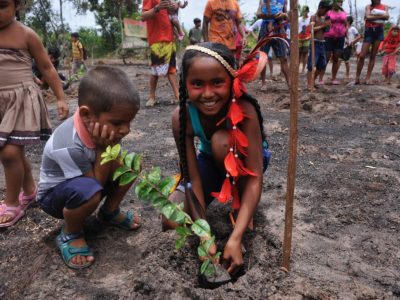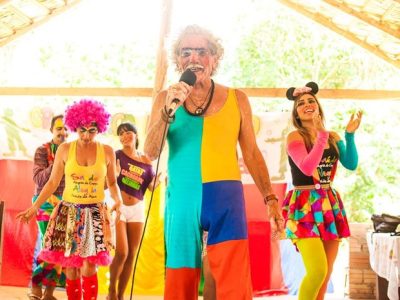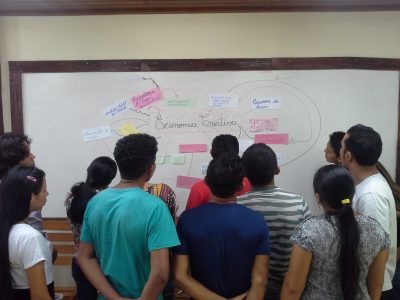Education, Culture and Communication
Mocoronga Communication Network
Established in 1987 by PSA, the network trains and supports more than 400 young people, in more than 30 communities in Western Pará to act as “forest reporters”.
The popular communication productions include radio programs, newspapers and community videos, fotonovelas, comic-style books, blogs and digital media. With a horizontal structure, the Network is led by a head office in the city of Santarém, with rural affiliates formed by the youth groups of each region. Each affiliate has its own name, identity, is self-managed and has autonomy to define story ideas, produce news and organize its work.
The PSA provides the necessary support for the implementation of affiliates, with infrastructure and equipment, as well as courses and workshops to improve content and production. As schools also provide important support for young reporters, PSA also offers Educommunication courses for teachers in partnership with the Municipal Departments of Education.
In order to further enrich the experience of the young participants and make their work recognized within and outside communities, partnerships and connections with other networks and commercial communication vehicles are constantly being established.
Mocoronga Network Pillars
Media-activism and local content
Although each group that makes up the Mocoronga Network has its own identity, they are all bound by a common interest: giving a voice to the local population, connecting them with the world and, at the same time, valuing their culture and their reality. Thus, the content produced by the young reporters focuses on community issues, including customs, cultural and traditional manifestations, problems and solutions. This is a communication made by the Amazon for the Amazon.
The network has been one of the main instruments of education and community mobilization, amplifying the dissemination of educational content created collectively on various PSA projects in the region, as well as of health, hygiene, waste/rubbish, child and adolescent rights, youth appreciation campaigns, environment, fire prevention, among other topics.
Mocoronga Radios and TV
The Rural Affiliates work along the lines of local radio stations (radio broadcasts and even mobile sound units such as radio canoes, radio bicycles and radio ox-carts). Three affiliates already have FM community radio. Additionally, Santarém Rural Radio (AM 710) broadcasts a weekly program produced by the Mocoronga Network, which airs educational vignettes and community news, and promotes events, projects and music by local artists.
Television production includes videos, soap operas, documentaries, and news and educational vignettes. The variety show “Mexe com Tudo” is scripted, recorded and edited by the youth of the network. All of the production is exhibited on large screens in intercommunity exhibits and circuits or on partner channels. The shows may also be viewed on the PSA YouTube channel.
In addition to local productions, the Mocoronga Network also covers events, manifestations and content related to the Amazon and its people. It’s first broadcast was the United Nations Conference on Environment and Development in Rio de Janeiro in 1992.
The Mocoronga Network won the Youth Mobilization Stories National Contest promoted by the NGO Aracati and the Kellogg Foundation in 2004, the International Yeomans Local Content Award granted in 2005 by the Global Knowledge Partnership (GKP) and the Open Knowledge Network (OKN) at the II World Summit on the Information Society in Tunisia.
Digital Inclusion
The access to information and communication technologies (ICTs) is fundamental not only for the work executed by the Mocoronga Network, but also for the full development of the rural Amazonian communities of Western Pará.
PSA first began to consider digital inclusion in the early 2000s, when it inaugurated the Cultural Telecenter in the Suruacá community, in lower Tapajós.
The result of collaborations and partnerships, this early initiative made PSA a key organization in defining a public digital inclusion policy for the Amazon.
In the first decade of the millennium, public efforts committed to promoting digital inclusion of Amazonian communities – such as the Telecentros.br Program and the “Navegapará” Program, whose creation was supported by PSA – did not yield expected results and left behind a legacy of idle infrastructure.
PSA’s current proposal is to use this infrastructure (classrooms and community spaces), revitalizing 18 Telecenters with solar energy generation and wireless Internet connection (available 24 hours per day) and the implementation of new access hubs. In addition to Wi-Fi, the Telecenters also have equipment for audiovisual productions and offer training courses and workshops on Educommunication. They also support creation of new, independent community media production groups and creative productions by forest YouTubers, community filmmakers, photographers and digital influencers.
The Telecenters enable the activity of the Mocoronga Network affiliates and are utilized in nearly all of PSA’s projects in the communities where they are located, including those focused on health, community-based tourism, participatory management, and entrepreneurship, among others.
See also
Lands of Learning
Mocorongo Circus
Youth Entrepreneurship
Rádio Mocoronga
Contact
- Av. Mendonça Furtado, 3979
- +55 93 3067-8000
- +55 93 99143-1091
- psa@saudeealegria.org.br
HOW TO HELP
Projeto Saúde & Alegria © 2020
Agência Fervo








